Nonfiction about prisoners and dead bodies, just one work of fiction (alas!) about tiny dragons, lunar tipplers, and attack oragami.
These were my favorite books I read for the first time this year, or, technicallyDec 2016-Nov 2017. I like to put the list together a little early each year, in the hopes of getting some of favorites placed under other people’s Christmas trees soon.
And speaking of which, you can always get my book, Arriving at Amen: Seven Catholic Prayers that Even I Can Offer, for any Catholic friends or folks curious about Catholicism. Plus, if you’d like to get a preview of my second book, which will be out in the fall of 2018, you can sign up here to get an email, just as soon as I’m allowed to give details (it’s in copyedits).
Without further ado, in roughly chronological order, is what I most loved:
From the Holy Mountain: A Journey Among the Christians of the Middle East by William Dalrymple
 An unfortunately timely book to read. Dalrymple’s book was published in 1999, and many of the Christian communities he visited in the Middle East were already under threat. Reading it now, I got to catch glimpses of peoples who had tenuously held on and been shaped by hardship, but who, now, had been expelled or killed. I was very grateful for his reporting.
An unfortunately timely book to read. Dalrymple’s book was published in 1999, and many of the Christian communities he visited in the Middle East were already under threat. Reading it now, I got to catch glimpses of peoples who had tenuously held on and been shaped by hardship, but who, now, had been expelled or killed. I was very grateful for his reporting.
Creating a Life Together: Practical Tools to Grow Ecovillages and Intentional Communities by Diana Leafe Christian
 Delightfully detailed. I’ve picked up other books on New Monasticism or other community-focused books, and I’ve found many of them too vague. While other books talk in terms of general themes, Creating a Life Together has case studies, land-use laws, etc. I’m not planning to create or join an intentional community in the next year or so, but this was a fascinating tour through successful (and failed!) communities and expanded my sense of what is possible.
Delightfully detailed. I’ve picked up other books on New Monasticism or other community-focused books, and I’ve found many of them too vague. While other books talk in terms of general themes, Creating a Life Together has case studies, land-use laws, etc. I’m not planning to create or join an intentional community in the next year or so, but this was a fascinating tour through successful (and failed!) communities and expanded my sense of what is possible.
He Leadeth Me by Walter J. Ciszek, SJ
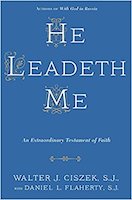 Fr. Ciszek snuck into the Soviet Union in 1940 to offer the sacraments to Catholics whose faith was suppressed. He was caught and imprisoned for 20 years (15 of them in a gulag). He wrote two books after he was freed, and He Leadeth Me is the shorter and more meditative of the two (I haven’t read With God in Russia). All the Soviet tortures are the backdrop to his relationship with God, and his struggles to choose God in the face of both external pressure and internal weaknesses. He treats his own pride as more grave a threat than imprisonment. It was a moving and shattering book.
Fr. Ciszek snuck into the Soviet Union in 1940 to offer the sacraments to Catholics whose faith was suppressed. He was caught and imprisoned for 20 years (15 of them in a gulag). He wrote two books after he was freed, and He Leadeth Me is the shorter and more meditative of the two (I haven’t read With God in Russia). All the Soviet tortures are the backdrop to his relationship with God, and his struggles to choose God in the face of both external pressure and internal weaknesses. He treats his own pride as more grave a threat than imprisonment. It was a moving and shattering book.
The Girl Who Drank the Moon by Kelly Barnhill
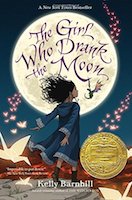 I loved all the books by Kelly Barnhill I read this year (Iron Hearted Violet, The Witch’s Boy, The Mostly True Story of Jack). Each of the books were so joyfully original (none of what I experienced with some other genre books I read this year, including those for adults, where I could see the tropes start falling into place). Each of the worlds she creates is distinct, and feels real enough to have room for many more stories than the one she shared with us. They were simple a delight to read (and brought me some peace at times I was also reading the next book on the list).
I loved all the books by Kelly Barnhill I read this year (Iron Hearted Violet, The Witch’s Boy, The Mostly True Story of Jack). Each of the books were so joyfully original (none of what I experienced with some other genre books I read this year, including those for adults, where I could see the tropes start falling into place). Each of the worlds she creates is distinct, and feels real enough to have room for many more stories than the one she shared with us. They were simple a delight to read (and brought me some peace at times I was also reading the next book on the list).
Miscarriage: Women Sharing from the Heart by Marie Allen and Shelly Marks
 A book that’s on my list for unhappy reasons. After losing my first child, this was the book that helped me the most. It’s an oral history of miscarriages, collected by Allen and Marks, who noticed how much women’s voices were being left out of women’s care. They interviewed a number of women, and present some of their stories in full and also group fragments together under themes (support (or not) of husbands, depression, naming children, etc). It was a big gift to have such a wide range of experiences collected together, giving me the chance for my experience to not be measured against the narrow range of “average=normal.” There are even moments of humor (e.g. when one husband, at a loss for how to be supportive, buys and installs a better dishwasher).
A book that’s on my list for unhappy reasons. After losing my first child, this was the book that helped me the most. It’s an oral history of miscarriages, collected by Allen and Marks, who noticed how much women’s voices were being left out of women’s care. They interviewed a number of women, and present some of their stories in full and also group fragments together under themes (support (or not) of husbands, depression, naming children, etc). It was a big gift to have such a wide range of experiences collected together, giving me the chance for my experience to not be measured against the narrow range of “average=normal.” There are even moments of humor (e.g. when one husband, at a loss for how to be supportive, buys and installs a better dishwasher).
The Power of Silence: Against the Dictatorship of Noise by Robert Cardinal Sarah
 My husband and I are almost done with Cardinal Sarah’s God or Nothing (about his own life, we’ve been reading parts of it aloud to each other every Sunday), but this one I read on my own. It was particularly excellent for me, since I tend to identify very strongly with Diane Duane’s description of wizards: “Wizards love words. Most of them read a great deal, and indeed one strong sign of a potential wizard is the inability to get to sleep without reading something first.” I bring books everywhere I go, and I’m usually either talking, reading, or both—always swept up in words, words, words.
My husband and I are almost done with Cardinal Sarah’s God or Nothing (about his own life, we’ve been reading parts of it aloud to each other every Sunday), but this one I read on my own. It was particularly excellent for me, since I tend to identify very strongly with Diane Duane’s description of wizards: “Wizards love words. Most of them read a great deal, and indeed one strong sign of a potential wizard is the inability to get to sleep without reading something first.” I bring books everywhere I go, and I’m usually either talking, reading, or both—always swept up in words, words, words.
Cardinal Sarah’s book helped me glimpse what it might be like to find peace in, well, peace, rather than motion. I’m a long way from desiring it, but I’m trying to make a little space for silence, so that I might know it better and learn to desire it. So far, this is mostly taking the form of fasting from speech on the walk to Mass.
Salt, Fat, Acid, Heat: Mastering the Elements of Good Cooking by Samin Nosrat
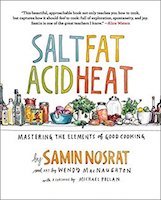 An excellent cookbook, because it’s goal is to give you a sense of how to mess around in the kitchen. By temperament, I prefer baking to cooking, where the rules are clear and there isn’t that much tasting and adjustment as you go, but this book made me feel a little better armed to taste my food as I make it and see about making it better. (We’ve added a little white wine vinegar to a lot more things after reading!).
An excellent cookbook, because it’s goal is to give you a sense of how to mess around in the kitchen. By temperament, I prefer baking to cooking, where the rules are clear and there isn’t that much tasting and adjustment as you go, but this book made me feel a little better armed to taste my food as I make it and see about making it better. (We’ve added a little white wine vinegar to a lot more things after reading!).
The Gift: Imagination and the Erotic Life of Property by Lewis Hyde
 I adored Hyde’s Trickster Makes This World: Mischief, Myth and Art, and this was also pretty great. I quoted from Hyde’s passages on usury on the blog already. The most refreshing thing about Hyde’s book is how seriously he takes the power of property (for good or ill) rather than treating as a quotidian reality.
I adored Hyde’s Trickster Makes This World: Mischief, Myth and Art, and this was also pretty great. I quoted from Hyde’s passages on usury on the blog already. The most refreshing thing about Hyde’s book is how seriously he takes the power of property (for good or ill) rather than treating as a quotidian reality.
War’s Unwomanly Face by Svetlana Alexievich
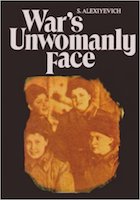 Quite similar in format to Allen and Marks’s oral histories on miscarriage earlier on this list. Alexievich also groups fragments of interviews by theme and lets some stories spool out in their entirety. Like all of her books, this one made me cry (sometimes loudly, on public transportation). It’s the combination of the horrors of what people endured and the persistence of small moments of personality and grace. One woman brought a pair of earrings to the WWII front, so she could have one womanly, beautiful thing in a war that asked her to cut off her hair and relinquish her femininity. She slept wearing them.
Quite similar in format to Allen and Marks’s oral histories on miscarriage earlier on this list. Alexievich also groups fragments of interviews by theme and lets some stories spool out in their entirety. Like all of her books, this one made me cry (sometimes loudly, on public transportation). It’s the combination of the horrors of what people endured and the persistence of small moments of personality and grace. One woman brought a pair of earrings to the WWII front, so she could have one womanly, beautiful thing in a war that asked her to cut off her hair and relinquish her femininity. She slept wearing them.
Night’s Bright Darkness: A Modern Conversion Story by Sally Read
 I really enjoyed reading a conversion story so different from my own. Read is a poet (and has been a nurse). She wasn’t argued into Catholicism in the same way I was, but seemed to have a susceptibility to it that in some way is the same sensitivity to beauty that guides her writing. It was a pleasure to read (in her lovely prose) how grace reshaped her life.
I really enjoyed reading a conversion story so different from my own. Read is a poet (and has been a nurse). She wasn’t argued into Catholicism in the same way I was, but seemed to have a susceptibility to it that in some way is the same sensitivity to beauty that guides her writing. It was a pleasure to read (in her lovely prose) how grace reshaped her life.
The Work of the Dead: A Cultural History of Mortal Remains by Thomas W. Laqueur
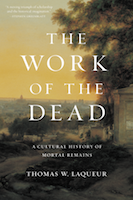 The sole book to make both the “Best of 2017” list and the “Books to read in 2017” list! It’s a book written by a man who seemed to be just so darn curious about his topic that he kept researching (and worried about how to justify his investigations later). Packed with fascinating stories about how our understanding of how to do right by the dead has changed. And includes some sectarian conflicts in which other sects forced Anglican ministers to allow dissenters bodies to be buried in their churchyards. Unfortunately, I read much of this on planes, which robbed me of an audience for reading bits aloud.
The sole book to make both the “Best of 2017” list and the “Books to read in 2017” list! It’s a book written by a man who seemed to be just so darn curious about his topic that he kept researching (and worried about how to justify his investigations later). Packed with fascinating stories about how our understanding of how to do right by the dead has changed. And includes some sectarian conflicts in which other sects forced Anglican ministers to allow dissenters bodies to be buried in their churchyards. Unfortunately, I read much of this on planes, which robbed me of an audience for reading bits aloud.
And if you’d like even more books, here’s my favorites from last year.
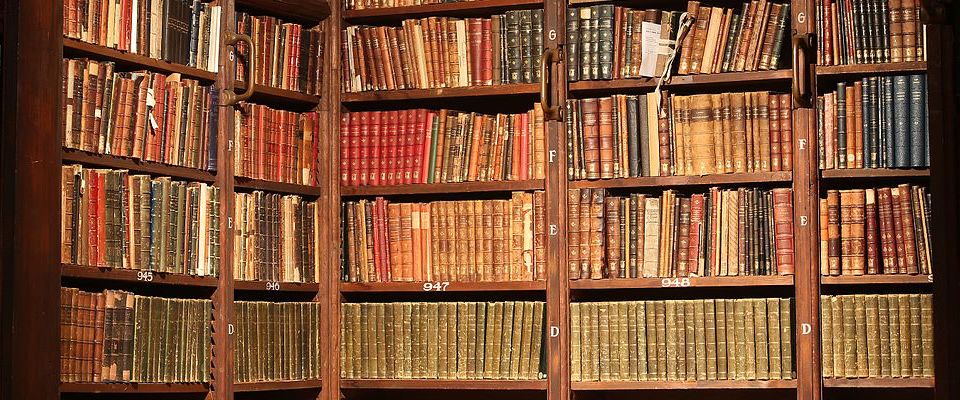
These all look great. You should do yourself a favor and read Robert Hugh Benson’s “The Friendship of Christ”.
Thanks for the tip!
[…] I would link to last year’s list, but it looks like I may not have compiled one since 2017, so here’s the link to all the way back then. […]